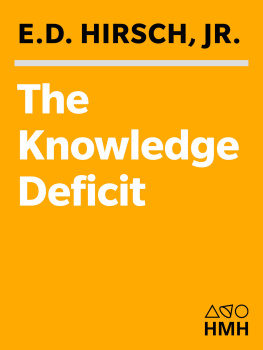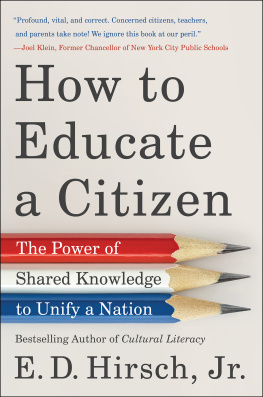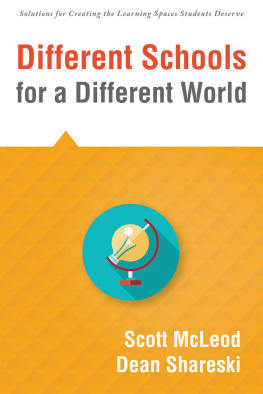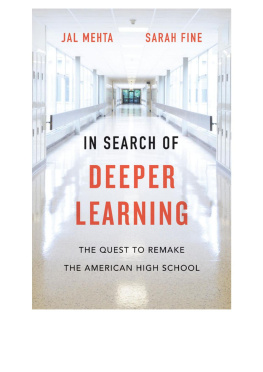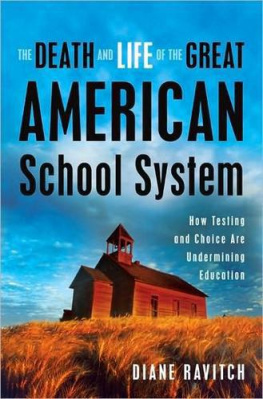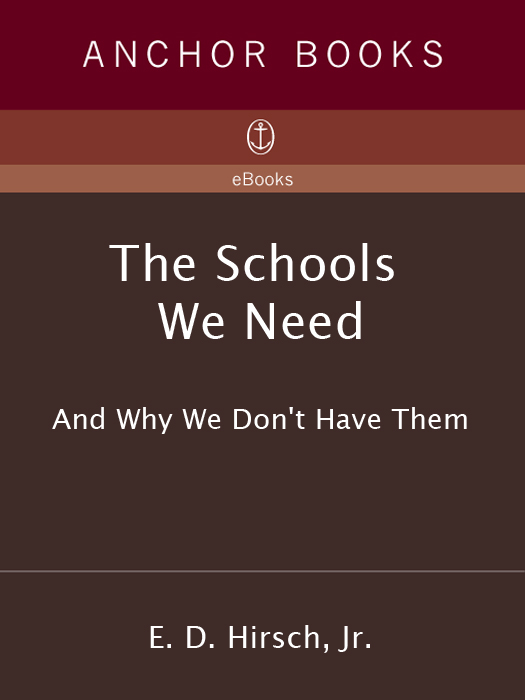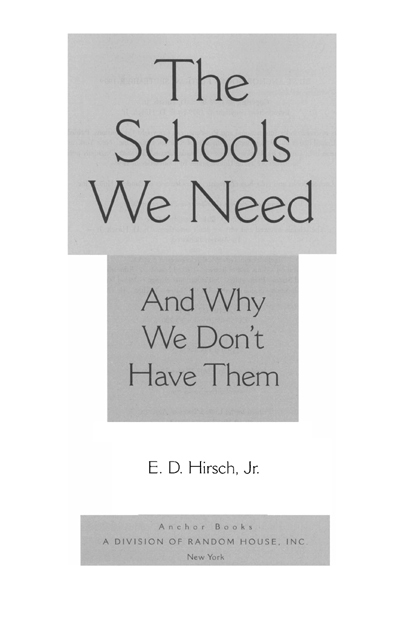Also by E. D. Hirsch, Jr.
Wordsworth and Schelling (1960)
Innocence and Experience: An Introduction to Blake (1964)
Validity in Interpretation (1967)
The Aims of Interpretation (1976)
The Philosophy of Composition (1977)
Cultural Literacy (1987)
The Dictionary of Cultural Literacy, with Joseph Kett and James Trefil (1988)
A First Dictionary of Cultural Literacy, with William Rowland and Michael Stanford (1989)
Editor, The Core Knowledge Series (199196)
What Your Kindergartner Needs to Know (1996)
What Your First Grader Needs to Know (1991)
What Your Second Grader Needs to Know (1991)
What Your Third Grader Needs to Know (1992)
What Your Fourth Grader Needs to Know (1992)
What Your Fifth Grader Needs to Know (1993)
What Your Sixth Grader Needs to Know (1993)
FIRST ANCHOR BOOKS EDITION, SEPTEMBER 1999
Copyright 1996 by E. D. Hirsch, Jr.
Introduction copyright 1999 by E. D. Hirsch, Jr.
All rights reserved under International and Pan-American Copyright Conventions. Published in the United States by Anchor Books, a division of Random House, Inc., New York, and simultaneously in Canada by Random House of Canada Limited, Toronto. Originally published in hardcover in the United States by Doubleday in 1996.
Anchor Books and colophon are registered trademarks of Random House, Inc.
Library of Congress Cataloging-in-Publication Data
Hirsch, E. D. (Eric Donald), 1928
The schools we need and why we dont have them / E. D. Hirsch, Jr.
1st Anchor Books ed.
p. cm.
Includes bibliographical references.
1. EducationAims and objectivesUnited States. 2. EducationUnited StatesPhilosophy. 3. Educational changeUnited States. 4. EducationSocial aspectsUnited States. I. Title. II. Title: Schools we need.
LA210.H57 1999
370.973dc20 99-28096
eISBN: 978-0-307-57556-2
www.anchorbooks.com
v3.1_r1
This Book Is Dedicated
to the Teachers and Principals of Core Knowledge Schools
and
to the Memory of Two Prophets,
William C. Bagley and Antonio Gramsci,
Who Explained in the 1930s
Why the New Educational Ideas
Would Lead to Greater Social Injustice
Acknowledgments
I am grateful for the encouragement of many friends and educators who have sustained my energy in writing this book.
I ventured to ask the best scholars and scientists I could think of for criticisms of the manuscript, not daring to hope that they would find the time to perform the onerous chore. Each responded with astonishing thoroughness and speed.
Three scholars generously surveyed the entire manuscript. They are Chester E. Finn, Jr., whose general acumen and knowledge of the policy scene are unparalleled, and whose editorial skills are legendary; Diane Ravitch, whose trenchant mind and unequaled knowledge of the history of contemporary American education make her the outstanding educational historian of our day; and Robert Siegler, a cognitive psychologist of great distinction, whom I have never met, but who, because of his profound commitment to improving the education of young children, agreed to vet the scientific side of the book, and who provided a detailed and enormously useful commentary.
Further expert commentary on the manuscript was provided by Carl Bereiter, David Breneman, David Geary, John Holdren, Michael Marshall, Albert Shanker, Herbert Walberg, Clint Wilkinson, and Dan Willingham. Answers to queries on specific points were generously provided by Marilyn J. Adams, John Bishop, Ronald Ferguson, Connie Juel, John Kelleher, Daniel Koretz, Archie LaPointe, John Lloyd, Brenda Loyd, Jean Osborn, Sandra Scarr, Harold Stevenson, and Sara Tarver.
Michael Angell was my cheerful, encouraging, well-informed, and tireless research assistant, who brought me many pounds of Xeroxes and books, thus freeing me for the task of reading them rather than searching for them.
In a special category belongs an astute critic of every word of this book at every stage of its compositionmy wife, Polly Hirsch. Patiently tolerant of my obsessions, she has gently led me into paths of sound common sense and toward a charitable understanding of the good intentions behind even the most egregiously failed educational practices.
I am filled with gratitude for all this help, which could only have come from a shared sense of the urgent need for what this book attempts to do. None of these outstanding scholars, educators, and scientists, to whom I owe so much, can be held responsible, however, for any shortcomings in this exposition. The defects are entirely my own.
Contents
Soon or late, it is ideas, not vested interests, which are dangerous for good or evil.
JOHN MAYNARD KEYNES ,
The General Theory of Employment,
Interest, and Money (1936)
The new concept of schooling is in its romantic phase, in which the replacement of mechanical by natural methods has become unhealthily exaggerated. Previously pupils at least acquired a certain baggage of concrete facts. Now there will no longer be any baggage to put in order. The most paradoxical aspect of it all is that this new type of school is advocated as being democratic, while in fact it is destined not merely to perpetuate social differences but crystallize them in Chinese complexities.
ANTONIO GRAMSCI ,
Prison Notebooks,
Quadrno XXIX (1932)
Blind mouths! that scarce themselves know how to hold A sheep-hook, or have learned aught else the least That to the faithful herdmans art belongs! What recks it them? What need they? They are sped; And when they list, their lean and flashy songs Grate on their scrannel pipes of wretched straw; The hungry sheep look up and are not fed.
JOHN MILTON ,
Lycidas, ll. 11925
Sed quis custodiet ipsos custodes? (Who will reform the reformers?)
JUVENAL ,
Satires, 6, l. 347
Introduction to the Paperback Edition
When this book was met with respectful praise rather than ideological scorn in 1966, it signaled to me that a change in educational thinking had occurred in our country since 1987 when the appearance of Cultural Literacy was greeted by the educational community with intense hostility. 1987 was not the right time for the ideas of that book to be heard. To paraphrase Matthew Arnold: for an idea to be heard two powers must concur, the power of the [idea] and the power of the moment, and the [idea] is not enough without the moment. What a difference a decade makes! Besides drawing gratifying reviews, The Schools We Need has brought me letters of support not just from parents and citizens and also from professors of education. A wide correspondence has ensued that has ripened into many friendships. It has introduced me to an Internet world of educational activists united in their determination to help our public schools fulfill the great founding aims of democratic education.
Especially delightful was my introduction to a group, diverse in every conceivable way, called Mathematically Correct, composed of sublimely smart California scientists and parents who were chiefly concerned about mathematics education, and had already worked out for themselves many of the ideas of this book. They regarded my marshaling of evidence as a scholarly confirmation of what they themselves had figured out about the progressive thoughtworld of American education. In 1998, they emerged victorious over expert opposition, and persuaded the California State Board of Education to institute tough math standards in the early grades. Their victory belongs to the children of California and the state as a whole.


